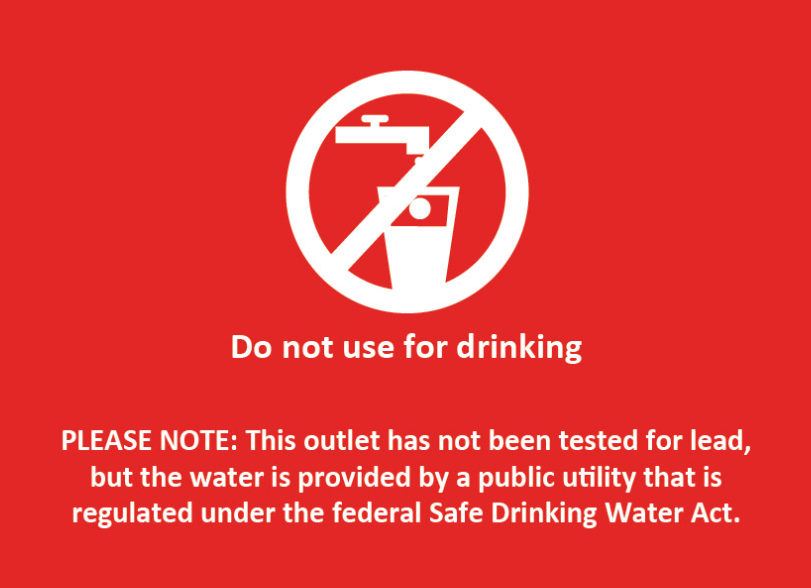View Reports
Reports are located on their individual school pages.
Testing for Lead in Drinking Water
The Howard County Public School System (HCPSS) has updated its schedule for testing all schools for the presence of lead in school drinking water. The testing program was initiated in 2018 to comply with a new state regulation requiring lead testing of drinking water outlets in all Maryland schools. An update to the regulation in 2021 redefined the lead action level from 20 parts per billion (ppb) to any amount greater than 5 ppb. As a result, any drinking water outlet tested before June 1, 2021 that exceeds the new action level will be turned off until it has been successfully remediated.
The state lead testing regulation, which is applicable to all Maryland schools, requires that all school water outlets used for consumption be tested, including drinking fountains, cafeteria kitchen sinks, etc. Signs are displayed on any non-drinking water outlets not subject to the water sampling, such as those in custodial sinks or science classrooms. The presence of a sign indicates only that a particular faucet has not been sampled; it does not indicate that a particular water supply is, or is suspected of, lead contamination.
HCPSS will continue to sample and analyze water from drinking water outlets at each school every three years. Initial sampling was conducted in the 2018-2019 and 2019-2020 school years, during which each school’s drinking water outlets were sampled once. View the updated current testing schedule.
In addition to what is required by the state regulation, HCPSS is conducting sampling activities within its schools that use well water.
Details about the testing schedule, procedures and other information are provided in the Frequently Asked Questions.
For more information:
- Testing for Lead in Drinking Water – Public and Nonpublic Schools – Maryland Department of the Environment (MDE)
HCPSS Contact:
Christopher Madden, Indoor Environmental Quality Manager, in the HCPSS Office of the Environment
Lead in Drinking Water Test Results
The Maryland Department of the Environment (MDE) recommends water outlets be taken out of service if the lead level exceeds 5 parts per billion (ppb). When a water outlet exceeds this level, the outlet is closed within 24 hours, and remedial actions are planned. Appropriate remedial actions can include evaluating the cause, and replacing the necessary fixture or plumbing.
Frequently Asked Questions
Which water outlets will be tested?
How will non-sampled outlets be identified?
When will my child’s school be tested?
What happens if lead is detected?
The law sets an action level of 5 parts per billion (ppb) for lead. If an outlet exceeds this level, the outlet must be closed and remedial actions initiated. Confirmatory sampling would be performed after remedial actions are completed.
How will I be notified if lead is detected at my child’s school?
Where can I find reports of the results of lead testing for my school?
All test results will be accessible on the school website within 30 days after the report is received.
How does lead enter the water supply?
The primary route of entry for lead to enter drinking water is through the plumbing system. Lead can leach into the drinking water from pipes, fittings and solder (used to connect copper pipes). To prevent this, water treatment plants add a corrosion inhibitor to the municipal water system. The inhibitor lines the interior of the pipes, protecting the pipes from leaching lead into the system. HCPSS receives water from the Washington Suburban Sanitary Commission (WSSC) and Baltimore City. Both reportedly add corrosion inhibitors to their water supply.
Well Water Quality Reports
The following reports are generated for schools where water is provided by a well: Bushy Park, Dayton Oaks, Lisbon, Triadelphia Ridge and West Friendship elementary schools; Folly Quarter and Glenwood middle schools; and Glenelg High School. The language used in the reports is based on EPA’s Guidance document, Preparing Your Drinking Water Consumer Confidence Report. The reports are designed to resemble the required annual consumer confidence report provided to consumers by their public water utility/provider informing them about their drinking water. Should you have questions or comments, please contact the Office of the Environment at 410-313-8874.
Lead Test Results for Well Water Schools
Per the Lead and Copper Rule, lead water samples were collected for well water schools.

